|
|
|
Sort Order |
|
|
|
Items / Page
|
|
|
|
|
|
|
| Srl | Item |
| 1 |
ID:
156080
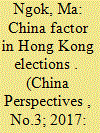

|
|
|
|
|
| Summary/Abstract |
The China factor has always been a significant structural, ideological, and organisational factor in Hong Kong elections. Since 2003, the deepening of intervention by Beijing and its Liaison Office in Hong Kong meant that the China factor as an organisational force became increasingly salient in elections. It also drove more people, especially young people, to resist China’s control and take the road of supporting independence or self-determination. The 2016 elections showed more ostensible intervention by the Liaison Office, and independence became a new campaign issue. The China factor will continue to be an integral part of Hong Kong elections in years to come.
|
|
|
|
|
|
|
|
|
|
|
|
|
|
|
|
| 2 |
ID:
162096
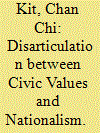

|
|
|
|
|
| Summary/Abstract |
Drawing upon the ethnic-civic dialogue of nationalism, this article shows how Chinese state nationalism disarticulates from the civic values of Hong Kong in the post-handover years. Surveys from 2010 to 2016 in general reveal a dwindling pride in Chinese state nationalism in Hong Kong, and its disarticulation from the treasured values of civic rights and qualities in the city. As seen in this study, Hong Kong Chinese articulation of nationalism in the form of Chinese ethnic icons shrank throughout the study period. The same study also shows that neither civic values nor cultural pride in Hong Kong are conducive to the building of Chinese state nationalism, nor are they a significant impetus to cultural resistance against China’s nation-building project in Hong Kong. The article empirically shows the limitation of nation-building, which relies mainly on ethnic appeal but less on civic dimensions. It also discusses to what extent the ethnic-civic dialogue of nation-building could inform Chinese state nationalism and resistance to it in post-handover Hong Kong.
|
|
|
|
|
|
|
|
|
|
|
|
|
|
|
|
| 3 |
ID:
066887
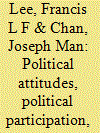

|
|
|
| 4 |
ID:
153347
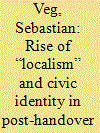

|
|
|
|
|
| Summary/Abstract |
While it was traditionally accepted that Hongkongers shared a form of pan-Chinese cultural identification that did not contradict their local distinctiveness, over the last decade Hong Kong has seen the rise of new types of local identity discourses. Most recently, “localists” have been a vocal presence. Hong Kong has – quite unexpectedly – developed a strong claim for self-determination. But how new is “localism” with respect to the more traditional “Hong Kong identity” that appeared in the 1970s? The present study takes a two-dimensional approach to study these discourses, examining not only their framework of identification (local versus pan-Chinese) but also their mode of identification (ethno-cultural versus civic). Using three case studies, the June Fourth vigil, the 2012 anti-National Education protest and the 2014 Umbrella movement, it distinguishes between groups advocating civic identification with the local community (Scholarism, HKFS) and others highlighting ethnic identification (Chin Wan). It argues that while local and national identification were traditionally not incompatible, the civic-based identification with a local democratic community, as advocated by most participants in recent movements, is becoming increasingly incompatible with the ethnic and cultural definition of the Chinese nation that is now being promoted by the Beijing government.
|
|
|
|
|
|
|
|
|
|
|
|
|
|
|
|
| 5 |
ID:
170190
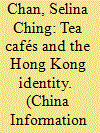

|
|
|
|
|
| Summary/Abstract |
This article examines the meanings of caa caan teng (茶餐廳, local cafés) in Hong Kong and the implications of such cafés on the Hong Kong identity. It argues that the local café is a representation of Hong Kong culture because it reflects Hong Kong’s political, economic, and social developmental paths and mirrors the everyday life of its people. I investigate how the interaction of different immigrant cultures in Hong Kong has resulted in the invention of hybrid foods at the local café. These foods demonstrate hybridity as the transgression of boundaries through the negotiation of cultural differences among migrants, as well as those between migrants and colonialists. I argue that hybridity in local cafés reflects the power relations among the locals in Hong Kong, between locals and colonialists, and between locals and the new authorities in Beijing. Hybridity found in local cafés symbolizes the Hong Kong identity, as an entanglement between the multiplicity of Chinese ethnicities and the colonial modernity as characterized by flexibility, efficiency, choice, and diversity. These features differentiate the Hong Kong people from the colonialists and the mainlanders, thus constructing their identity and subjectivity, as former colonial subjects now living in the ‘periphery’ of the motherland.
|
|
|
|
|
|
|
|
|
|
|
|
|
|
|
|
| 6 |
ID:
190403
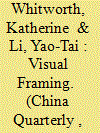

|
|
|
|
|
| Summary/Abstract |
This study focuses on the Hong Kong Lennon Walls and the communications posted there. We assert that the physical placement of COVID-19 related images on the Lennon Walls of Hong Kong and the replication of symbols and iconography from the Umbrella Movement and the Anti-ELAB Movement situated COVID-19 discourse not only physically within but also symbolically within the contentious politics of Hong Kong. We conclude that the messages and images posted on Lennon Walls between January and April 2020 have used COVID-19 to extend public expression of sentiment on the debates around the Hong Kong government and to further mobilize a sense of Hong Kong identity against China. The findings contribute to the understandings of how the cultural politics surrounding the pandemic became a collective action frame in the mobilization of a localized Hong Kong political identity against the Hong Kong and Chinese governments.
|
|
|
|
|
|
|
|
|
|
|
|
|
|
|
|
| 7 |
ID:
166627
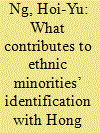

|
|
|
|
|
| Summary/Abstract |
The context of Hong Kong has not always been favourable for the integration of ethnic minorities, who face various difficulties in education, employment, and daily life. Research, however, has shown that many minorities, particularly the youth, have developed a fair sense of belonging to the city. To explore this puzzle, this study conducted semi-structured interviews with 20 South Asian and Filipino youth and identified four main factors that may be associated with their local identification. They are (1) experiencing less discrimination, (2) achieving a higher level of sociocultural adaptation, (3) having an inclusive conception of Hong Kong identity, and (4) claiming to have received more social benefits. The findings suggest that the context of Hong Kong is not entirely detrimental for ethnic minorities to develop a local identification. Ethnic minorities themselves are also active agents in the construction of identity. Theoretical and policy implications of the findings are discussed.
|
|
|
|
|
|
|
|
|
|
|
|
|
|
|
|
|
|
|
|
|